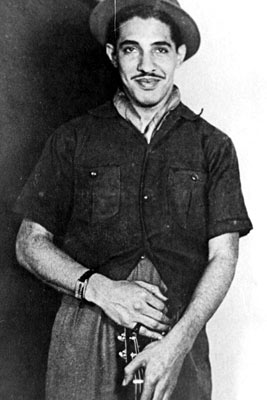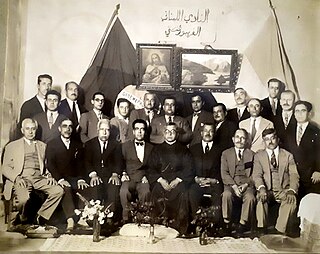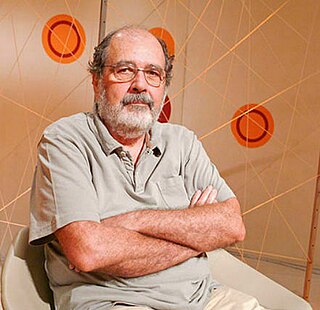
Brazil, officially the Federative Republic of Brazil, is the largest country in South America and in Latin America. Brazil is the world's fifth-largest country by area and the seventh most populous. Its capital is Brasília, and its most populous city is São Paulo. The federation is composed of the union of the 26 states and the Federal District. It is the only country in the Americas to have Portuguese as an official language. It is one of the most multicultural and ethnically diverse nations, due to over a century of mass immigration from around the world, and the most populous Roman Catholic-majority country.
Roma or ROMA may refer to:

Maria do Carmo Miranda da Cunha, known professionally as Carmen Miranda, was a Portuguese-born Brazilian singer, dancer and actress. Nicknamed "The Brazilian Bombshell", she was known for her signature fruit hat outfit that she wore in her American films. As a young woman, she designed hats in a boutique before making her first recordings with composer Josué de Barros in 1929. Miranda's 1930 recording of "Taí ", written by Joubert de Carvalho, catapulted her to stardom in Brazil as the foremost interpreter of samba.

Stefan Zweig was an Austrian writer. At the height of his literary career, in the 1920s and 1930s, he was one of the most widely translated and popular writers in the world.

Dorival Caymmi was a Brazilian singer, songwriter, actor, and painter active for more than 70 years, beginning in 1933. He contributed to the birth of Brazil's bossa nova movement, and several of his samba pieces, such as "Samba da Minha Terra", "Doralice" and "Saudade da Bahia", have become staples of música popular brasileira (MPB). Equally notable are his ballads celebrating the fishermen and women of Bahia, including "Promessa de Pescador", "O Que É Que a Baiana Tem?", and "Milagre". Caymmi composed about 100 songs in his lifetime, and many of his works are now considered to be Brazilian classics. Both Brazilian and non-Brazilian musicians have covered his songs.

Ary de Resende Barroso was a Brazilian composer, pianist, soccer commentator, and talent-show host on radio and TV. He was one of Brazil's most successful songwriters in the first half of the 20th century. Barroso also composed many songs for Carmen Miranda during her career.

Arab Brazilians are Brazilian citizens of Arab ethnic, cultural, linguistic heritage and identity. The majority of Arab Brazilians trace their origin to the Levantine region of the Arab World, known in Arabic as Bilad al-Sham, primarily from Lebanon and Syria, as well as Palestine. Arab Brazilians are Christians in the great majority. The first Syrians and Lebanese arrived in São Paulo around 1880. It is not known exactly when, although the Syrians and Lebanese say that in 1885 there was a small core of peddlers working in the market square. By 1920, the census listed 50,246 Syrians and Lebanese in Brazil, 38.4% (2/5) of these in the state of São Paulo. The 1940 census enumerated 48,614 Syrians, Lebanese and other related groups with a decrease of approximately 1647 people. As immigration almost ceased after 1929 and the colony aged, it is surprising that the decline was not even greater. The trend of the period between 1920 and 1940 was the continuous concentration of Syrians and Lebanese in São Paulo. Almost half (49.3%) of Syrians and Lebanese residents in Brazil lived in São Paulo.

Alberto de Almeida Cavalcanti was a Brazilian-born film director and producer. He was often credited under the single name "Cavalcanti".

Down Argentine Way is a 1940 American musical film made in Technicolor by Twentieth Century Fox. It made a star of Betty Grable in her first leading role for the studio although she had already appeared in 31 films, and it introduced American audiences to Carmen Miranda. It also starred Don Ameche, The Nicholas Brothers, Charlotte Greenwood, and J. Carrol Naish.
A list of films produced in Brazil ordered by year and split onto separate pages by decade. For an alphabetical list of films currently on Wikipedia see Category:Brazilian films

Carlos Diegues, also known as Cacá Diegues, is a Brazilian film director. He was born in Maceió, Alagoas, and is best known as a member of the Cinema Novo movement. He is popularly known for his unconventional, yet intriguing film techniques among other film producers of the Cinema Novo movement. Diegues is also widely known for his dynamic use visuals, ideas, plots, themes, and other cinematic techniques. He incorporated many musical acts in his film as he favored musical pieces to be complementary of his ideas. Diegues remains very popular and is regarded as one of the most cinematic producers of his generation. Of the Cinema Novo directors, he would go on to produce films, plays, musicals and other forms of entertainment in Brazil.
Luciana Maria Arrighi is a Brazilian-born, Australian-Italian production designer. In 1993, she won an Oscar for Best Art Direction for the film Howards End (1992), becoming the first Brazilian-born person to win an Oscar. She also earned two more Oscar nominations in the same category for The Remains of the Day (1993) in 1994, and Anna and the King (1999) in 2000. In 2003, she won the BAFTA Award for Best Art Direction for the television film The Gathering Storm (2002).

The Cinemateca Brasileira is the institution responsible for preserving Brazilian audiovisual production. In July 2021, it experienced a major fire.

The history of Brazilian animation is relatively recent. In the first half of the 20th century, there were some small experiments produced in animation without much continuity, to the emergence of several animated films in the other half of the century. The 21st century saw the advent of many animated series for television.

WACK!: Art and the Feminist Revolution was an exhibition of international women's art presented at the Museum of Contemporary Art, Los Angeles from March 4–July 16, 2007. It later traveled to the National Museum of Women in the Arts and the PS1 Contemporary Art Center, where it was on view February 17–May 12, 2008. The exhibition featured works from 120 artists and artists' groups from around the world.

Events in the year 1940 in Brazil.

Cinédia was a Brazilian film studio established on 15 March 1930 in Rio de Janeiro, and remained in continual operation until 1951.














